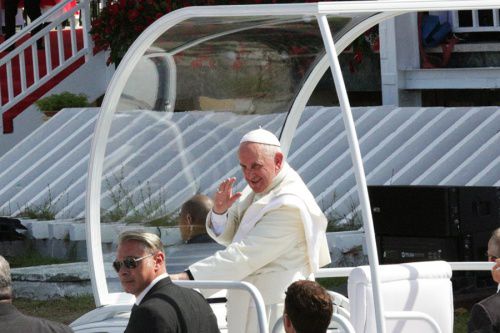Pope Francis Monday celebrated his second public Mass during his papal visit to Cuba, reflecting that an encounter with Christ has the power to transform even the most rejected sinners into missionaries. “The gaze of Jesus gives rise to missionary activity, service, self-giving,” the Pope said, drawing his inspiration from the conversion of St. Matthew, whose feast is celebrated Sept. 21. “Jesus' love heals our short-sightedness and pushes us to look beyond, not to be satisfied with appearances or with what is politically correct.” Reminding the faithful that they too are sinners, the pontiff called them to take a moment and “recall with gratitude and happiness those situations, that moment, when the merciful gaze of God was felt in our lives.” “He sees beyond this, to our dignity as sons and daughters, a dignity at times sullied by sin, but one which endures in the depth of our soul,” the Pope Francis said. “He came precisely to seek out all those who feel unworthy of God, unworthy of others.” Tens of thousands were in attendance at the papal Mass in Cuba's southeast city of Holguín, in the central Revolution Square, marking the second full day of Pope Francis' visit to the island nation, which runs from Sept. 19-22. He is the third Roman pontiff to visit the country, having been preceded by St. John Paul II in 1998 and Benedict XVI in 2012. Pope Francis spoke on the conversion of St. Matthew, an apostle and evangelist, whose Gospel account tells “us what it was like, this encounter (with Jesus) which changed his life.” “How strong was the love in that look of Jesus, which moved Matthew to do what he did!” the Pope said. “What power must have been in his eyes to make Matthew get up from his table!” At the time of this call, Matthew had been working as a tax-collector. Also known as a publican, it was a reviled profession which involved the collection taxes from the Jews to give to the Romans. Those who engaged in this work were considered traitors. “Publicans were looked down upon and considered sinners; as such, they lived apart and were despised by others,” the pontiff said. “One could hardly eat, speak or pray with the likes of these.” “Jesus, on the other hand, stopped; he did not quickly take his distance. He looked at Matthew calmly, peacefully. He looked at him with eyes of mercy; he looked at him as no one had ever looked at him before.” Just as when Jesus called Zacchaeus, Bartimaeus, Mary Magdalen, and Peter, the pontiff said, his look “look unlocked Matthew’s heart; it set him free, it healed him, it gave him hope, a new life.” Pope Francis reflected on how Matthew encountered the “joy of service” in Jesus' gaze, and left behind his live as a tax-collector to follow Christ's mission. Jesus, moreover, challenges us in our belief: “Do you believe it is possible that a traitor can become a friend? Do you believe is possible that the son of a carpenter can be the Son of God?” “His gaze transforms our way of seeing things, his heart transforms our hearts. God is a Father who seeks the salvation of each of his sons and daughters.”
The Pope then called the faithful to look upon the Lord in the Sacraments of the Eucharist and Confession. He also invited them to extend their gaze to those who “feel excluded and abandoned,” like the sick, those in prison, the elderly, and families experiencing difficulties. “Again and again we are called to learn from Jesus, who always sees what is most authentic in every person, which is the image of his Father.” The Pope acknowledge the work and challenge of the Catholic Church in Cuba to spread the Gospel, including the “most remote areas,” especially “mission houses.” In light of the shortage of Churches and priests, these mission houses “provide for many people a place for prayer, for listening to the word of God, for catechesis and community life,” the Pope said. “They are small signs of God’s presence in our neighborhoods and a daily aid in our effort to respond to the plea of the apostle Paul: 'I beg you to lead a life worthy of the calling to which you have been called, with all lowliness and meekness, forbearing one another in love, eager to maintain the unity of the Spirit in the bond of peace' (cf. Eph 4:1-3).” Pope Francis concluded his homily by appealing to Our Lady of Charity of El Cobre, the patroness of Cuba. “May her 'eyes of mercy' ever keep watch over each of you, your homes, your families, and all those who feel that they have no place. In her love, may she protect us all as she once cared for Jesus.”
A photo posted by Catholic News Agency (@catholicnewsagency) o
Sep 21, 2015 at 8:08am PDTrn

